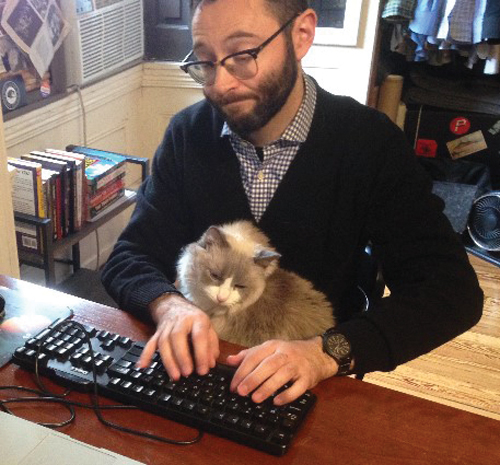
Zachary Loeb, history and sociology of science doctoral candidate, works from home.
Courtesy of Zachary Loeb
Wednesday, May 20, 2020
Katelyn Silva
“I study the end of the world,” says Zachary Loeb. The doctoral candidate in the Department of History and Sociology of Science researches technology, disasters, and doom-saying, and explains, “I’ve always been particularly interested in the idea that human beings, specifically through science and technology, would be the agents for bringing about the end of the world.”

Zachary Loeb, history and sociology of science doctoral candidate, works from home.
Courtesy of Zachary Loeb
Twenty years ago, some thought the end of the world had come and its name was Y2K. At the time, many computer programs allowed for only two digits for the year, as opposed to four. With the turn from 1999 to 2000, many feared that computers would be unable to interpret the “00” change and technology breakdowns would lead to widespread chaos. Visions of nuclear power plant disasters, planes falling from the sky, and banks shutting down entirely became part of the collective consciousness. But none of that came to be.
What people don’t understand about Y2K, says Loeb, is just how serious the threat actually was and how much work went into making sure 2000 arrived with little incident. Loeb’s dissertation delves into the massive amount of effort that went into avoiding what could have been catastrophic and the hidden history behind Y2K.
Reflecting on COVID-19 as another end-of-the-world-type scenario, he says, “Crisis situations like this one and those throughout history have always been about people dealing with the end of the world as they know it. The COVID-19 situation is tragic and horrible. Many people have lost their lives and many more will. But this isn’t going to be an extinction-level event. The planet earth is not going to suddenly vanish. The question is what will we learn? How will we respond?”